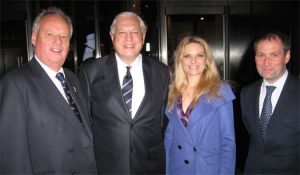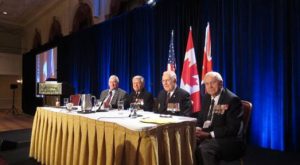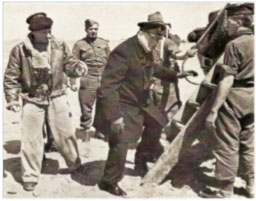
Bulletin #53 - Nov 2012
Inspirational Role of Sir Winston Churchill: The Power of Words
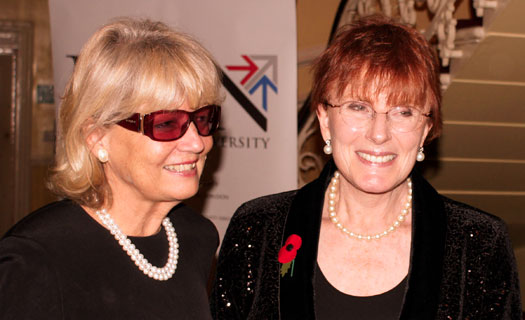
November 1, 2012
Churchill granddaughter Celia Sandys gives a talk at the historic Polish Hearth Club in South Kensington, London.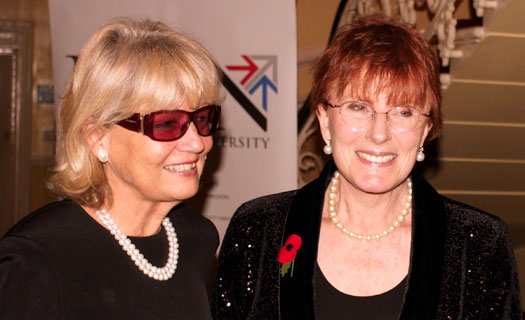 Mrs Barbara Hamilton and Hon. Celia Sandys
Mrs Barbara Hamilton and Hon. Celia Sandys
By Celia Lee
Talk by Hon. Celia Sandys
Thursday, 25th October 2012
‘Bring back Churchill’s politics’ was the message of Sir Winston Churchill’s granddaughter the Honourable Celia Sandys, at a dinner and talk at the Polish Hearth Club, London, on Wednesday night 24th October 2012.
The talk was one of a literary series put on by Mrs Barbara Hamilton the newly-elected Chairman of the Polish Hearth Club, South Kensington, London, in aid of the club’s rejuvenation scheme.

2025 International Churchill Conference
The power and influence of the leadership qualities of the late Sir Winston Churchill, wartime Prime Minister (1940-45), were brought to life again. Speaking for 40 minutes at a packed dinner that included Sir Richard Branson’s mother, Mrs Eve Huntley Branson, and Mr Lee Pollock, Executive Director of the Churchill Centre US, who jetted in specially, from Chicago for the talk at the invitation of Churchill historian Mrs Celia Lee, the audience hung on Miss Sandys’ every word. She left them in no doubt that Sir Winston Churchill’s leadership and his power of words are as relevant to politicians today as they were in the 1940s.
Miss Sandys who was very close to her grandfather throughout his life and often rode with him in his car, opened her talk by setting straight Sir Winston’s position on Poland in the Second World War post-war settlement.
‘Poland was very close to my grandfather’s heart. At the Yalta Conference he said he wanted: ‘… a strong, free and independent Poland’. It was this that was so dear to the hearts of the British nation and the British Commonwealth of Nations. It was for this that we had gone to war against Germany, that Poland should be free and sovereign. Sadly for the Polish, Britain and Churchill had become the junior partner in 1945, after valiantly standing alone four years earlier. It was therefore left to a scheming Marshall Stalin and a dying President Roosevelt to determine Poland’s fate. At the end of his life Churchill’s great regret was that the Iron Curtain which had come down across Europe was still in place with Poland locked behind it.
‘This evening, I will bring you some examples of how my grandfather inspired and led by his very powerful words. … Most people know that my grandfather was the master of words – spoken and written.
‘As a politician his speeches became some of the most famous ever made.
As a journalist and author he supported his family and his own life-long extravagant life style. He famously stated at the Plaza Hotel in New York: ‘I am a man of simple tastes easily satisfied by the best.’
‘Whenever he needed some money he picked up his pen, and his children used to say: ‘We lived from pen to mouth’. During his life he wrote 44 books and countless articles, and was awarded the Nobel Prize for literature.
Quoting Miss Tina Santi Flaherty’s introductory words at the Morgan Library exhibition in New York in June of this year, Miss Sandys said: ‘On making Winston Churchill an Honorary citizen of the United States of America, President Kennedy said he mobilised the English language and sent it into battle.’
‘The impact of my grandfather’s words during World War II was more powerful than any weapon. … Whether speaking in the House of Commons or on the radio the effect was profound. So many people have told me how his speeches gave them hope when they were in despair. And wherever they listened whether here or in the United States, whether in London during the blitz or hiding out in occupied Europe listening to radios which would have been their death sentence if they had been discovered, everyone remembers those moments and for some people it was their first conscious moment – there listening with their parents – to the ritual of Winston Churchill on the radio. He knew that the only way that he could inspire people was to make them believe that he believed that Victory was possible.
‘As time passed, following his death in 1965, Winston Churchill became an historical figure who fewer and fewer people could actually remember. Then, following the tragic events of September 11th he stepped quite literally right out of the history books and back onto the international stage where he had spent so much of his long life. Leaders everywhere called on the inspiration and example of Winston Churchill. The speeches of President George W. Bush and Prime Minister Tony Blair rang out with Churchillean tones confirming that Winston Churchill’s inspiring leadership is as relevant today as it was in 1940.
‘Faced with the global financial crisis the Euro zone disaster or the war in Afghanistan the constant cry is: ‘We need another Churchill’.
‘So why is leadership so sought after now? It’s always important but there seems to be something about the present age that makes it more important than ever? I feel the answer is change. The world is always changing but every so often it goes through a period of very rapid change. Change that can seem threatening; where are things going? What kind of world will be living in 20 years from now or even in five? Leadership is about change and discontinuity. The very best leaders are those who are able to deal with change but are also able to anticipate it. Leaders who can make sense of what is happening and look ahead explain the situation to others and offer a vision of how to move forward.
‘The 1930s and 40s were such a time. Churchill was not only able to lead his country in its darkest hour, he was also the most articulate interpreter of what was happening and what was likely to happen. He saw the foremost of what Hitler represented and what Hitler planned to do.
‘These skills come to the fore in times like the present when everything seems to be changing from safety in our cities to the climate to the internet-driven revolution and the way we do business… These are times when we need the best leadership we can get to deal with the threats that face us and to seize the opportunities.
‘Churchill became Prime Minister at age 65, in the most daunting circumstances imaginable. Hitler’s blitzkrieg was over-running continental Europe, Britain was about to stand alone. Strong leaders need a challenge… . This is how Churchill described his emotions of the time: Film clip played of Churchill speaking: ‘I felt as if … all my past life had been but a preparation for this hour.’ My grandfather was reflecting the fact that his whole life had been devoted to inspiring leadership.
‘The main pillars of his leadership were courage, integrity, vision, and communication. Of these the prime characteristic was courage of which he wrote: ‘Courage is rightly esteemed the first of human qualities because it is the quality that guarantees all the others.’
‘It is moral rather than physical courage that is most important for great leaders. Integrity is probably the element that is most questioned in politics today. No one displayed greater integrity than Churchill the politician. He believed in and followed certain principles but at the same time reserved the right to change his mind which he explained like this: ‘The only way a man can remain consistent during changing circumstances is to change with them while reserving the same dominating purpose.’
‘He remained at odds with his party [the Conservatives] throughout the 1930s as he warned against the resurgent Germany. As a result, he was left in the wilderness until he was found to be indispensable to his country in its darkest hour. Then, with Churchill as Prime Minister the nation saw leadership as it had never been seen before. He addressed Parliament honestly: Film clip played of Churchill’s voice: ‘I would say to the house as I have said to those who have joined the government, I have nothing to offer but blood, toil, tears, and sweat.’
‘Stamping his leadership on a wavering government Churchill explained the grim situation…; there was spontaneous approval that Britain would fight on: Film clip played of Churchill’s: ‘… we shall fight on the beaches, we shall fight on the landing grounds, we shall fight in the fields and in the streets, we shall never surrender.’
‘There are two lessons to be learned for all leaders from Churchill’s political career through the 30s … as a leader Churchill’s vision ranged over a wide field, most significant was his strategic vision of the defence of the free world.’
Of her grandfather’s one great failure, the Dardanelles Campaign during the First World War in 1915, Miss Sandys said: ‘In 1959, when I was cruising with him on Aristotle Onassis’ yacht in the Mediterranean it was decided to go through the Dardanelles at dead of night so that he would not know where we were. The next morning he said to me: ‘They thought I wouldn’t know where we were, but of course I did.’ He loved maps and would have been following the journey hour by hour on his maps.
‘The list of Churchill’s visionary innovations is long and varied: pension schemes, social security in the early 1900s, tank and naval aviation in World War I, the promoting of radar for World War II, and the Mulberry Harbours for ‘D’ Day are just a few.’ [A Mulberry harbour was a portable temporary harbour developed by the British in World War II to facilitate rapid offloading of cargo onto the beaches during the Allied invasion of Normandy. Two prefabricated or artificial military harbours were taken across the English Channel from Britain with the invading army in sections and assembled off the coast of Normandy as part of the D-Day invasion of France in 1944.]
‘Vision and courage to challenge convention can do little if a leader cannot convey his or her ideas clearly and convincingly. Even today, 60 years after the event, you can listen to my grandfather’s words without ever wondering ‘what did he mean by that?’.
‘Great leaders bring out the inner strength that people often do not know they possess. It has been said that Hitler could persuade you that he could do anything, but that Churchill could persuade you that you could do anything. He gave each and every man and woman an heroic role to play [during the war].
‘Churchill did not use speechwriters; his close friend F.E. Smith [the Attorney General] the Earl of Birkenhead said: ‘Winston has devoted the best years of his life to making impromptu speeches’. There are lessons here from modern leaders whose speeches often betray their origin in committee. Communications skills apply not only in delivering soaring speeches but, to every day events.
Churchill’s wit was a useful part of his armoury. When an opposing speaker in a parliamentary debate noticed that Churchill was apparently dozing he asked: ‘Must you sleep when I am speaking?’ Churchill without opening his eyes replied: ‘No it is purely voluntary.’ ‘
‘He had great respect and had old-fashioned respect for women… . One day he was at a state dinner in Richmond Virginia, and chicken was being served. So when the butler came round the table with the dish and said [to Winston:] ‘What part of the bird would you like’, he replied: ‘I would like breast, please’. A lady sitting next to him said: ‘Mr Churchill in this country we call it white meat or dark meat’. The Next morning she received a little bunch of flowers with a note saying: ‘Please pin this on your white meat.’ ‘
‘Courage, integrity, vision, and his ability to communicate were the main pillars of Churchill’s leadership but there were other important elements. In his first 6 weeks as Prime Minister he made 5 dangerous flights to France in the hope of putting steel into the French Government, which was on the point of collapse. …
During the course of the war he went to Canada three times, to Moscow twice, to America six times, and to Teheran… the Western Desert, Italy and Normandy.
On one occasion he was in an un-pressurised aircraft and he insisted that the oxygen mask was adjusted so that he could breathe in the oxygen and puff away at his Havana cigar.
Sir Winston Churchill addressed the Canadian Parliament in Ottawa on December 30, 1941 – Film clip played: ‘When I warned [the French] that Britain would fight on alone, whatever they did, their Generals told their Prime Minister and his divided cabinet: ‘In three weeks, England will have her neck wrung like a chicken. – Some chicken [thunderous applause] – Some neck!’ [uproar].
‘Strong leaders should never appear desperate as we see from Churchill’s courtship of Roosevelt in the two years before [the Japanese bombed] Pearl Harbour. With Europe overrun [with Germans] it seemed that Britain would soon succumb, causing Roosevelt to hesitate in sending the material help which Britain sought. The Prime Minister’s advisers suggested passing British technical secrets wholesale in exchange for more rapid assistance. Churchill demurred saying: ‘If an exchange is to be arranged I should like to carry it out piece by piece.’
‘How does a leader under enormous pressure relieve the stress? This was my grandfather’s recipe. Change is the master key the cultivation of a hobby, and new forms of interest, is important to a public man. He was a man of many interests but his favourite diversion was painting. I was with him when he put the final brush strokes to one of his last paintings. [A dazzling still life, “Oranges and Lemons”.] Whenever I look at it I hope that he is up there on his cloud fulfilling his ambition for the afterlife, which was this: ‘… When I get to Heaven I mean to spend a considerable portion of my first million years in painting and so get to the bottom of the subject.’
Miss Sandys completed her stunning tribute to her famous grandfather in a room where Chairman Mrs Barbara Hamilton remarked to Celia Lee afterwards: ‘It was so quite – I have never known it so quiet’ – with a poem:
‘The poem which is a tribute written by his friend [Alfred] Duff Cooper that really summed up how the British people despite voting him out of office after the war felt about him after the war, and many people here and in America felt the same:
‘When ears were deaf and tongues were mute
You told of doom to come;
When others fingered on the flute
You thundered on the drum;
When armies marched and cities burned and all you said came true,
Those who have mocked your warnings turned almost too late to you;
When doubt gave way to firm belief and through five cruel years,
You gave us glory in our grief and laughter through our tears;
When final honours are bestowed and last accounts are done,
Then shall we know how much was owed by all the world to one.’
Issued by Celia Lee – Press Executive [English speaking] –
The Polish Hearth Club, 55 Exhibition Road, London SW7 2PN
Thursday 25th October 2012.
Photo courtesy of Mr Jacek Korzeniowski. Pictured: Mrs Barbara Kaczmarowska Hamilton, Chairman of the Polish Hearth Club; Churchill granddaughter the Honourable Celia Sandys.
Subscribe
WANT MORE?
Get the Churchill Bulletin delivered to your inbox once a month.

